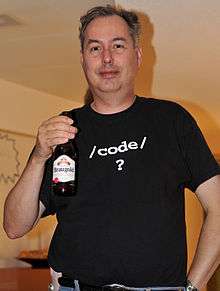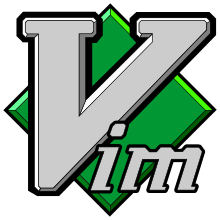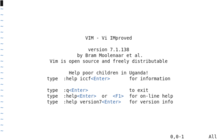Bram Moolenaar
Bram Moolenaar (born 1961, Lisse) is a Dutch computer programmer and an active member of the open-source software community. He is the original author, maintainer, release manager, and benevolent dictator for life of Vim,[1] a vi-derivative text editor that is very popular among programmers and power users. Since July 2006, Moolenaar has been employed by Google,[2][3] working in the Zürich office.[4] He is able to spend part of his time maintaining Vim.[2]


Charity work and awards
Moolenaar is an advocate of the ICCF charity, encouraging people to support orphans in Uganda. He pioneered a methodology called charityware through Vim.[5] The software itself is available for free, but it encourages the user to donate to the programmer's favorite charity.[6] A number of other applications have been licensed this way since the inception of this concept.[7] The opening "splash" screen for Vim encourages support of ICCF.
Moolenaar has been a member of the Dutch Unix user group, NLUUG, which presented him with an award[8] during its 25th anniversary, for his creation of Vim and his contributions to open source software in general.
Vim

The Vim editor started as "Vi IMitation" on the Amiga in 1988, but was later relabeled "Vi IMproved"[9] and ported to many other platforms. As vi was a popular editor amongst programmers and system administrators, initially there was doubt whether Bram's 'improved' version could achieve the quality and fan following of the original. But since its first release for Unix systems in 1992, Vim has effectively eclipsed the original Vi, having won several awards[10] and has been referred to as one of the most popular text editors.[11][12][13]
Other software
Other software tools that Moolenaar has developed include a software build tool written in Python, called A-A-P,[14] which is similar to make, and a programming language called Zimbu[15] which puts an emphasis on readability of programs. Bram is also an assurer for the non-profit certificate authority CAcert, which means that he is eligible to verify the identities of people using the CAcert web of trust model. Amongst all of Moolenaar's contributions to the field of computer science, the Vim editor remains his most prominent and widely used application.
References
- Rehman, Rafeeq Ur; Paul, Christopher (2003). The Linux development platform: configuring, using, and maintaining a complete programming environment. Prentice Hall PTR. pp. 37–. ISBN 978-0-13-009115-4. Retrieved 30 March 2011.
- "Yahoo! Groups". groups.yahoo.com. Retrieved 31 March 2018.
- "Gmail adds documents search". Official Gmail Blog. 15 October 2012. Retrieved 13 September 2016.
- Moolenaar, Bram. "Vim 25 presentation on 2016 November 2". youtube.com. Retrieved 18 April 2020.
- Marshall, Wayne (1 January 2001). "Algorithms in Africa". Linux Journal. Archived from the original on 21 July 2012. Retrieved 30 March 2011.
- Moolenaar, Bram. "The Vim license, provided in the Vim reference manual". vimdoc.sourceforge.net. Retrieved 31 March 2018.
- "charityware . info | for developers and users who care". charityware.info. Archived from the original on 28 April 2009. Retrieved 31 March 2018.
- "NLUUG Award". 2008. Retrieved 9 November 2011.
- "The continuing story of Vim" (PDF). Moolenaar.net. Retrieved 13 November 2012.
- "Vim". Moolenaar.net. Retrieved 10 February 2012.
- Jacob Gube. "The 15 Most Popular Text Editors for Developers". Sixrevisions.com. Retrieved 10 February 2012.
- "14 Most Popular Text Editors for Linux | TuxArena Blog". Tuxarena.blogspot.com. Retrieved 10 February 2012.
- "Best Text Editors". Lifehacker.com. 1 May 2008. Retrieved 10 February 2012.
- "Homepage of the A-A-P project". www.a-a-p.org. Retrieved 31 March 2018.
- Moolenaar, B., "the Zimbu programming language", Retrieved on 16 March 2014